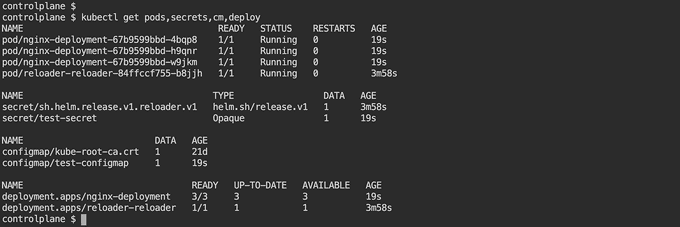
ConfigMap and Secret Data Reloading Made Simple with Reloader 🔄
Content
Simple ConfigMap and Secret Updates 🆕
🌠 Introduction
Kubernetes ConfigMaps and Secrets are essential for injecting environment variables and application secrets into pods. However, updating these configurations can be challenging, as changes are not automatically propagated to running pods.
Reloader is a Kubernetes controller that automates the process of detecting and reflecting changes to ConfigMaps and Secrets in running pods. This eliminates the need for manual restarts or volume reattachments, and ensures that your applications are always up-to-date.
In this blog post, we will discuss the benefits of using Reloader, and how to deploy and configure it in your Kubernetes cluster. We will also provide some code snippets to help you get started.
There's a lot of work to do, so roll up your sleeves and get busy.

Getting to Know Reloader
Imagine you're in charge of keeping your applications running smoothly on a Kubernetes playground. But hey, things change, right? You might need to tweak how your apps behave — like telling them to use a different secret password or to play nice with updated settings.
Now, meet your helpful buddy: Reloader. It's like a watchful wizard that hangs around ConfigMaps and Secrets in Kubernetes. Whenever those sneaky settings change, Reloader takes the cue and says, "Hey, your apps need to catch up!" It works some magic to gently update your apps, making sure they stay happy and snug in their pods. And the cool part? You don't need to wave your wand manually — Reloader does it for you.
Deploy Reloader to Kubernetes Cluster
There are multiple deployment options available, including using manifests and Helm. In this blog, we will explore both methods.
Using Helm
Add the Helm chart:
helm repo add stakater https://stakater.github.io/stakater-charts
helm repo update

Deploy Reloader:
helm install reloader stakater/reloader # To watch CM/secrets in all namespaces
helm install reloader stakater/reloader --set reloader.watchGlobally=false --namespace NAMESPACENAME # To watch CM/Secrets in one namespace

Using Vanilla Manifests
Apply vanilla manifests by changing the RELEASE-NAME placeholder provided in the manifest with a proper value and apply it by running the command given below:
kubectl apply -f https://raw.githubusercontent.com/stakater/Reloader/master/deployments/kubernetes/reloader.yaml
kubectl apply -k https://github.com/stakater/Reloader/deployments/kubernetesBy default, Reloader gets deployed in the default namespace and watches changes to secrets and configmaps in all namespaces.
Reloader can be configured to ignore the resources secrets and configmaps by passing the following args (spec.template.spec.containers.args) to its container.
This will create a Reloader pod and the required resources.
For more details, visit the Reloader GitHub repository.
How to Use Reloader
For a Deployment called foo, have a ConfigMap called foo-configmap or Secret called foo-secret or both. Then add your annotation (by default reloader.stakater.com/auto) to the main metadata of your Deployment:
kind: Deployment
metadata:
annotations:
reloader.stakater.com/auto: "true"
spec:
template:
metadata:This will discover deployments, daemonsets, and statefulsets automatically where foo-configmap or foo-secret is being used either via an environment variable or from a volume mount. It will perform rolling upgrades on related pods when foo-configmap or foo-secret are updated.
You can restrict this discovery to only ConfigMap or Secret objects that are tagged with a special annotation. To take advantage of that, annotate your deployments/daemonsets/statefulsets like this:
kind: Deployment
metadata:
annotations:
reloader.stakater.com/search: "true"
spec:
template:
metadata:Reloader will trigger the rolling upgrade upon modification of any ConfigMap or Secret annotated like this:
kind: ConfigMap
metadata:
annotations:
reloader.stakater.com/match: "true"
data:
key: valueprovided the secret/configmap is being used in an environment variable, or a volume mount.
Note:
reloader.stakater.com/searchandreloader.stakater.com/autodo not work together. If you have thereloader.stakater.com/auto: "true"annotation on your deployment, then it will always restart upon a change in configmaps or secrets it uses, regardless of whether they have thereloader.stakater.com/match: "true"annotation or not.
We can also specify a specific configmap or secret which would trigger a rolling upgrade only upon a change in our specified configmap or secret. This way, it will not trigger a rolling upgrade upon changes in all configmaps or secrets used in a deploymentconfig, deployment, daemonset, statefulset, or rollout. To do this, either set the auto annotation to "false" (reloader.stakater.com/auto: "false") or remove it altogether, and use annotations for Configmap or Secret.
It's also possible to enable auto reloading for all resources by setting the --auto-reload-all flag. In this case, all resources that do not have the auto annotation set to "false" will be reloaded automatically when their ConfigMaps or Secrets are updated. Notice that setting the auto annotation to an undefined value counts as false as well.
🏪 ConfigMap
To perform rolling upgrades when changes happen only on specific configmaps, use the below annotation. For a Deployment called foo, have a ConfigMap called foo-configmap. Then add this annotation to the main metadata of your Deployment:
kind: Deployment
metadata:
annotations:
configmap.reloader.stakater.com/reload: "foo-configmap"
spec:
template:
metadata:Use a comma-separated list to define multiple configmaps:
kind: Deployment
metadata:
annotations:
configmap.reloader.stakater.com/reload: "foo-configmap,bar-configmap,baz-configmap"
spec:
template:
metadata:For more details, visit the Reloader GitHub repository.
🔐 Secret
To perform rolling upgrades when changes happen only on specific secrets, use the annotation below.
For a Deployment called foo, have a Secret called foo-secret. Then add this annotation to the main metadata of your Deployment:
kind: Deployment
metadata:
annotations:
secret.reloader.stakater.com/reload: "foo-secret"
spec:
template:
metadata:Use a comma-separated list to define multiple secrets:
kind: Deployment
metadata:
annotations:
secret.reloader.stakater.com/reload: "foo-secret,bar-secret,baz-secret"
spec:
template:
metadata:💫 Notes
Reloader also supports sealed-secrets. Here are the steps to use sealed-secrets with Reloader.
For rollouts, Reloader simply triggers a change; it is up to you how you configure the rollout strategy.
reloader.stakater.com/auto: "true"will only reload the pod if the ConfigMap or Secret is used (as a volume mount or as an env) in DeploymentConfigs/Deployment/Daemonsets/Statefulsets.secret.reloader.stakater.com/reloadorconfigmap.reloader.stakater.com/reloadannotation will reload the pod upon changes in the specified ConfigMap or Secret, irrespective of the usage of ConfigMap or Secret.- You may override the auto annotation with the
--auto-annotationflag. - You may override the search annotation with the
--auto-search-annotationflag and the match annotation with the--search-match-annotationflag. - You may override the ConfigMap annotation with the
--configmap-annotationflag. - You may override the Secret annotation with the
--secret-annotationflag. - You may want to prevent watching certain namespaces with the
--namespaces-to-ignoreflag. - You may want to watch only a set of namespaces with certain labels by using the
--namespace-selectorflag. - You may want to watch only a set of secrets/configmaps with certain labels by using the
--resource-label-selectorflag. - You may want to prevent watching certain resources with the
--resources-to-ignoreflag. - You can configure logging in JSON format with the
--log-format=jsonoption. - You can configure the "reload strategy" with the
--reload-strategy=<strategy-name>option (details below).
🎲 Reload Strategies
Reloader supports multiple "reload" strategies for performing rolling upgrades to resources. The following list describes them:
-
env-vars: When a tracked
ConfigMap/Secretis updated, this strategy attaches a Reloader-specific environment variable to any containers referencing the changed ConfigMap or Secret on the owning resource (e.g., Deployment, StatefulSet, etc.). This strategy can be specified with the--reload-strategy=env-varsargument. Note: This is the default reload strategy. -
annotations: When a tracked
ConfigMap/Secretis updated, this strategy attaches areloader.stakater.com/last-reloaded-frompod template annotation on the owning resource (e.g., Deployment, StatefulSet, etc.). This strategy is useful when using resource syncing tools like ArgoCD, since it will not cause these tools to detect configuration drift after a resource is reloaded.Note: Since the attached pod template annotation only tracks the last reload source, this strategy will reload any tracked resource should its ConfigMap or Secret be deleted and recreated. This strategy can be specified with the
--reload-strategy=annotationsargument.
For more details, visit the Reloader GitHub repository.
🌟 Test Reloader: Hands-on
To test the Reloader, I will deploy a deployment that uses a ConfigMap and a Secret to inject environment variables into its pod.
Create ConfigMap and Secret
apiVersion: v1
kind: ConfigMap
metadata:
name: test-configmap
data:
test_env: "foo"
---
apiVersion: v1
data:
pass: bXlwYXNzd29yZA==
kind: Secret
metadata:
name: test-secretCreate Deployment
apiVersion: apps/v1
kind: Deployment
metadata:
name: nginx-deployment
labels:
app: nginx
annotations:
configmap.reloader.stakater.com/reload: "test-configmap"
secret.reloader.stakater.com/reload: "test-secret"
spec:
replicas: 3
selector:
matchLabels:
app: nginx
template:
metadata:
labels:
app: nginx
spec:
containers:
- name: nginx
image: nginx:1.14.2
ports:
- containerPort: 80
env:
- name: TEST_ENV
valueFrom:
configMapKeyRef:
name: test-configmap
key: test_env
- name: TEST_PASS
valueFrom:
secretKeyRef:
name: test-secret
key: pass

Note: The annotations in the deployment are used to watch specific ConfigMap or Secret.
secret.reloader.stakater.com/reload: "test-secret"watches for the secrettest-secret. Any changes to this secret will trigger a rolling upgrade of the deployment.configmap.reloader.stakater.com/reload: "test-configmap"watches for the ConfigMaptest-configmap. Any changes to this ConfigMap will trigger a rolling upgrade.
There are other supported annotations that can be added to a deployment or statefulset:
reloader.stakater.com/auto: "true": This will look for all ConfigMaps or Secrets being used either via environment variables or mounts and trigger a rolling upgrade if any changes are made to those ConfigMaps/Secrets.

Update ConfigMap
Once the deployment is created, make a change in the ConfigMap. You will notice a rolling upgrade has been triggered by the deployment, and new pods come up with updated values from the ConfigMap. ✒️

Update Secret
You can also make a change in the Secret. You will notice a rolling upgrade has been triggered by the deployment, and new pods come up with updated values from the Secret. 🎉

🔚 Summary
Reloader is a powerful tool that can help you automate rolling upgrades in Kubernetes. It monitors changes to ConfigMaps and Secrets, and then triggers rolling upgrades for associated pods. This eliminates the need for manual restarts or volume reattachments, and ensures that your applications are always up-to-date.
In this blog post, we discussed how to deploy Reloader using manifests and Helm, and how to use it to reload ConfigMaps and Secrets. We also explored a real-world use case where Reloader was used to automate rolling upgrades based on changes in associated ConfigMaps.
By leveraging Reloader's capabilities, you can enhance the reliability and efficiency of your Kubernetes deployments. When deploying Reloader, be sure to adapt the deployment method and configuration to your specific environment and requirements.
For more details, visit the Reloader GitHub repository.
Until next time, つづく 🎉
💡 Thank you for Reading !! 🙌🏻😁📃, see you in the next blog.🤘 Until next time 🎉
🚀 Thank you for sticking up till the end. If you have any questions/feedback regarding this blog feel free to connect with me:
♻️ LinkedIn: https://www.linkedin.com/in/rajhi-saif/
♻️ X/Twitter: https://x.com/rajhisaifeddine
The end ✌🏻
🔰 Keep Learning !! Keep Sharing !! 🔰
📅 Stay updated
Subscribe to our newsletter for more insights on AWS cloud computing and containers.
